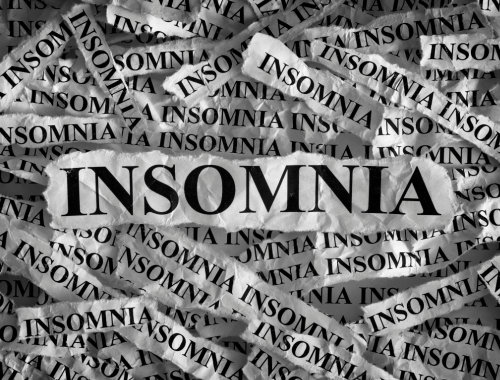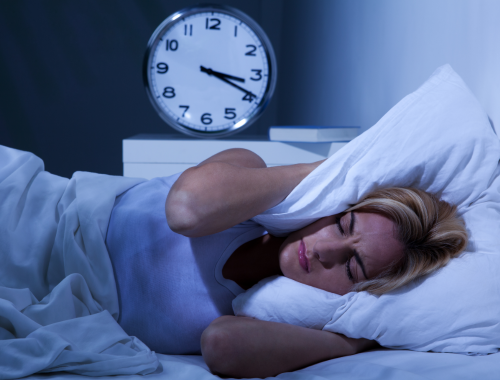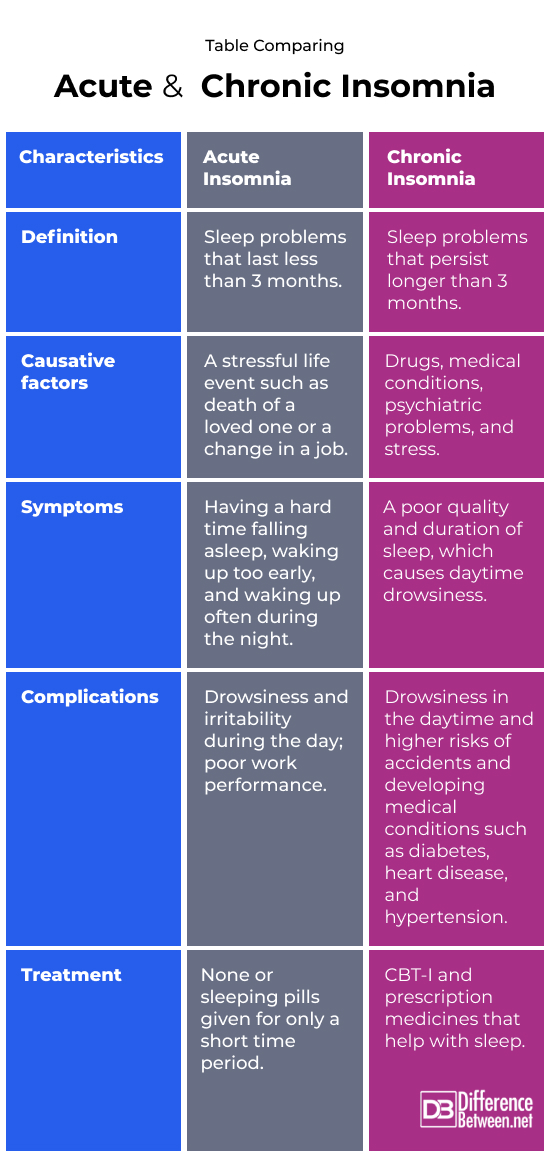Difference Between Acute and Chronic Insomnia
Acute insomnia refers to sleep problems that do not last beyond 3 months while chronic insomnia is sleep difficulties that persist beyond 3 months.

What is Acute insomnia?
Definition:
This refers to difficulty with sleep that only lasts a short while and not longer than about 3 weeks. It is also known as adjustment insomnia.
Causes and prevalence:
Acute insomnia is caused by some type of stress in your life, such as the death of someone close to you or a change in your job (losing a job or even starting a job). It is quite common for people to have acute insomnia. In fact, about 1/3 of individuals will experience this at some stage in their lives.
Symptoms and complications:
The signs of acute insomnia include the following: having a hard time falling asleep and then waking up during the night. People also feel tired during the day and become moody and irritable. The person with this type of insomnia may also awaken earlier than usual after sleep.
Diagnosis:
Diagnosis can be made on the basis of the symptoms and the fact that the patient has had a significant life change, causing stress.
Treatment:
Acute insomnia may need no treatment. The one option is to use sleeping pills but this is best done for only a short while.

What is Chronic insomnia?
Definition:
Chronic insomnia is a lack of sufficient sleep that does not go away and last for longer than 3 months.
Causes and prevalence:
There are many causes of chronic insomnia including the use of drugs, stress, and medical problems. Medications such as antidepressants and antipsychotics can cause chronic insomnia, but there are others that can also be a problem. Medical disorders like acid reflux or thyroid disorders can also cause insomnia. Chronic insomnia occurs in about 10% of the population. Almost half of people with psychiatric conditions also suffer from chronic insomnia.
Symptoms and complications:
Chronic insomnia does not go away after a few months, but it persists. People with this condition do not get enough hours of sleep or they may not sleep properly but rather keep waking during the night. The quality or quantity of sleep can be a problem with chronic insomnia. Inadequate sleep can increase your chances of an accident in the workplace or even when driving your car. Poor sleep can also increase your odds of developing high blood pressure, diabetes, and heart disease.
Diagnosis:
Diagnosis is based on the patient’s description of symptoms. A sleep study can also be done to better determine the sleep issues a patient is experiencing. A physical exam should be done to assess if the patient has a medical issue causing the insomnia.
Treatment:
In severe cases, cognitive behavioral therapy for insomnia (CBT-I) may be recommended. Chronic sleep problems can be reversed if the underlying cause can be corrected.
Difference between Acute and Chronic insomnia?
Definition
Acute insomnia describes sleep problems, which last less than 3 months. Chronic insomnia describes sleep problems that persist longer than 3 months.
Causative factors
A stressful life event such as death of a loved one or a change in a job are causes of acute insomnia. Drugs, medical conditions, psychiatric problems, and stress are causes of chronic insomnia.
Symptoms
The symptoms of acute insomnia include finding it difficult to fall asleep, waking up too early, and waking up often during the night. The symptoms of chronic insomnia include poor quality and duration of sleep, resulting in sleepiness during the day.
Complications
The complications of acute insomnia include irritability and drowsiness during the day. The complications of chronic insomnia include drowsiness during the day and an increased risk of developing illnesses.
Treatment
Acute insomnia can be treated short-term with sleeping pills. Chronic insomnia can be treated with medication and also CBT-I.
Table comparing Acute and Chronic Insomnia

Summary of Acute Vs. Chronic insomnia
- Acute and chronic insomnia are both types of sleeping problems.
- Acute insomnia is when there are sleep problems that do not last long.
- Chronic insomnia is when sleep issues persist for longer than about 3 months.
FAQ
How do I know if my insomnia is chronic?
If you continue to have problems with sleeping for more than 90 days, then odds are you have chronic insomnia.
Is acute insomnia the same as insomnia?
Acute insomnia is insomnia that does not last beyond about 3 months.
How do you know if you have acute insomnia?
You have acute insomnia if it happens after something stressful has occurred, and if the problem does not last beyond 90 days.
What factors contribute to acute insomnia versus chronic insomnia?
Acute insomnia is due to a stressful event in your life while chronic insomnia can have additional causes such as medications and underlying medical conditions.
Does chronic insomnia ever go away?
You can cure chronic insomnia if it is because of an underlying medical problem. For instance, a person may have acid reflux causing them problems with sleeping and if this is corrected, the insomnia will be fixed.
Can you fully recover from chronic insomnia?
It is possible to fully get over chronic insomnia but it depends on what the cause of the condition is.
- Difference Between Rumination and Regurgitation - June 13, 2024
- Difference Between Pyelectasis and Hydronephrosis - June 4, 2024
- Difference Between Cellulitis and Erysipelas - June 1, 2024
Search DifferenceBetween.net :
Leave a Response
References :
[0]Ellis, Jason G., et al. "Acute insomnia: current conceptualizations and future directions." Sleep medicine reviews 16.1 (2012): 5-14.
[1]Saddichha, Sahoo. "Diagnosis and treatment of chronic insomnia." Annals of Indian Academy of Neurology 13.2 (2010): 94.
[2]Schwab, Richard J. “Insomnia and excessive daytime sleepiness (EDS)”. Merckmanuals. Merck & Co., 2022, https://www.msdmanuals.com/professional/neurologic-disorders/sleep-and-wakefulness-disorders/insomnia-and-excessive-daytime-sleepiness-eds
[3]Image credit: https://www.canva.com/photos/MAEEwhPsvbk-insomnia/
[4]Image credit: https://www.canva.com/photos/MADBfbIB2q0-insomnia/
